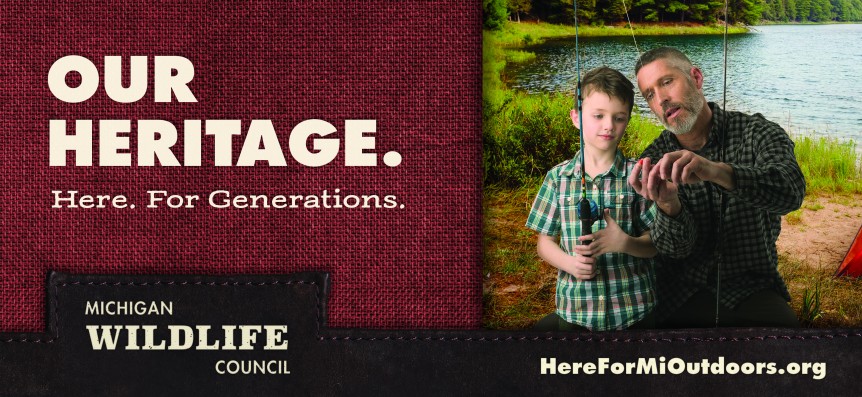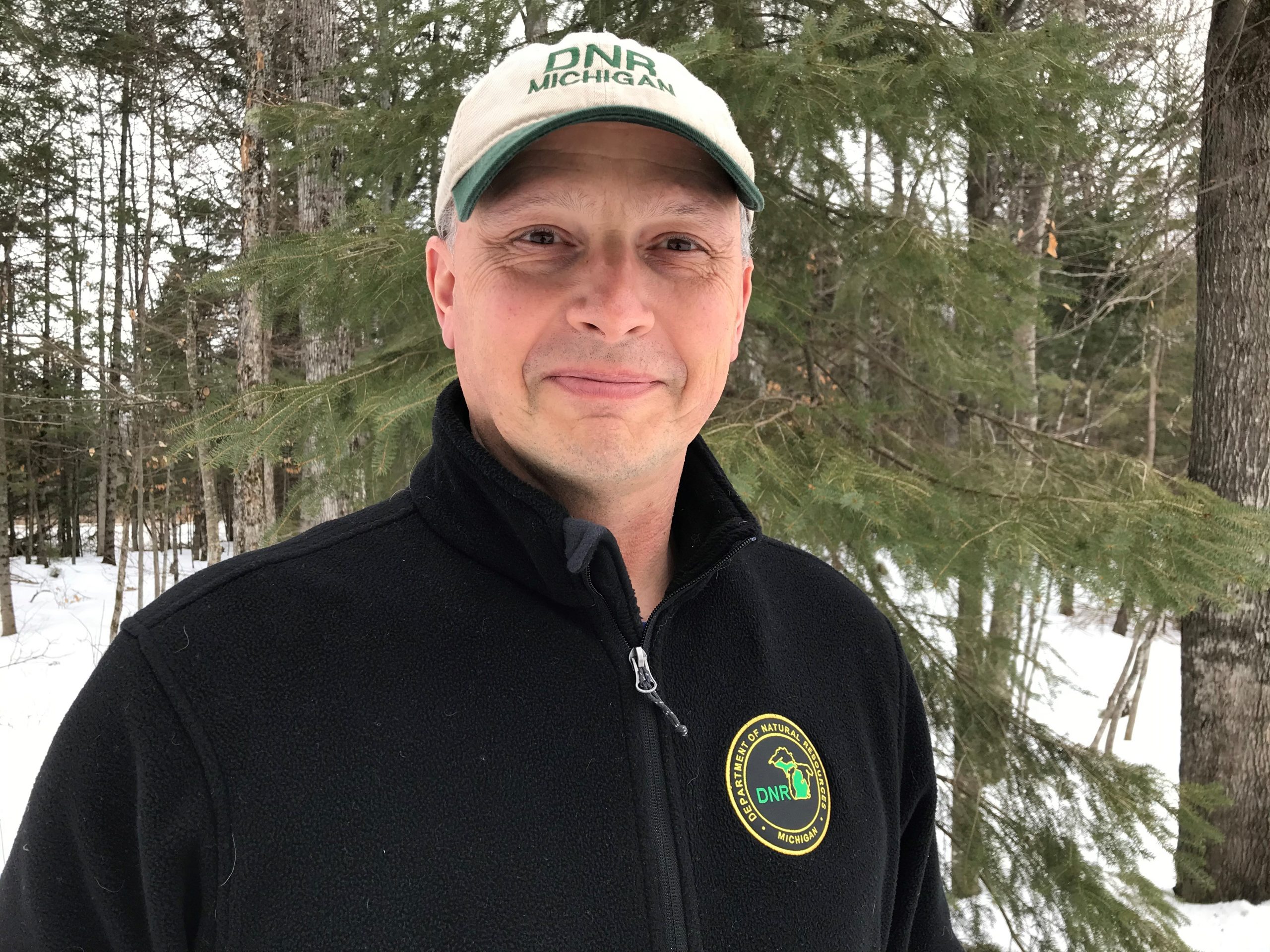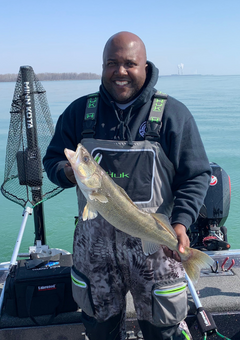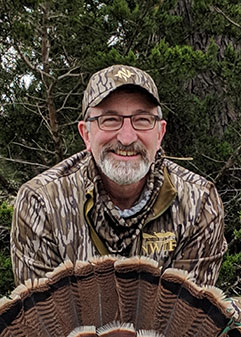Michigan Wildlife Council
The overall mission for the Michigan Wildlife Council, set in statute: MCL 324.43532B (18), is to:
“Develop and implement, in conjunction with a third-party marketing or advertising agency, a comprehensive media-based public information program to promote the essential role that sportsmen and sportswomen play in furthering wildlife conservation and to educate the general public about hunting, fishing, and the taking of game. That education shall include, but is not limited to, teaching that hunting, fishing, and the taking of game are any of the following:
1) Necessary for the conservation, preservation, and management of this state’s natural resources.
2) A valued and integral part of the cultural heritage of this state and should forever be preserved.
3) An important part of this state’s economy.”
The media-based public information program is funded in total through a $1 surcharge on hunting and fishing licenses sold in the State of Michigan. The Michigan Wildlife Council received over 1.5 million dollars from sportsmen in 2017.
Marketing Campaign
www.hereformioutdoors.org

Why and How?
Benefits for All
These are some of the many benefits to the public funded and provided by sportsmen:

Hunting and Fishing Keep Wildlife Healthy
- Collected revenues provide for the protection and reintroduction of native species such as our elk and wild turkey.
- Hunting keeps herd numbers at a level the habitat can support – keeping our wildlife resources healthy and sustainable.
- Hunting is necessary for maintaining healthy and diverse populations of wildlife.
- License fees help finance the identification and protection of species that are deemed “of special concern, threatened or endangered.
Hunting and Fishing Make Michigan Beautiful
- Wildlife management keeps a balance that benefits public, private, and wildlife interests.
- Revenues go to conserving Michigan’s beautiful forests and lands and enhancing habitat for wildlife.
- Revenues go to preserving the quality and quantity of water in our lakes, rivers, and streams.
- Revenues from fishing are used to stock lakes and streams, and monitor the health and sustainability of the diverse fisheries in Michigan’s rivers, lakes, and streams.


Hunting and Fishing is Big Business
- Wildlife management strives for a balance that benefits public, private and wildlife interests.
- Tens of thousands of jobs in both rural and urban communities are sustained and supported (72,000+).
- License revenues go to conserving the wildlife and natural beauty found throughout Michigan.
- Creating a heritage that instills within individuals a personal connection to Michigan.
Legislation

The Michigan Wildlife Council shall develop and implement, in conjunction with a third-party marketing or advertising agency, a comprehensive, media-based public information program to promote the essential role that sportsmen and sportswomen play in furthering wildlife conservation and to provide information about hunting, fishing and the taking of game. That education shall include, but not be limited to, teaching that hunting, fishing, and the taking of game are any of the following:
- Necessary for the conservation, preservation and management of this state’s natural resources.
- A valued and integral part of the cultural heritage of this state and should forever be preserved.
- An important part of this state’s economy.
Schedules, Minutes, Reports
2024
Schedule:
Agendas:
Minutes:
Operational Plans & Budgets:
Reports to the Legislature:
2023
Schedule:
Operational Plans & Budgets:
Reports to the Legislature:
2022
Schedule:
Operational Plan & Budget:
Reports to the Legislature:
2021
Schedule:
Operational Plan & Budget:
Reports to the Legislature:
2020
Schedule:
Operational Plan & Budget:
Reports to the Legislature:
2019
Schedule:
Operational Plan & Budget:
Reports to the Legislature:
2018
Schedule:
Operational Plan & Budget:
Reports to the Legislature:
2017
Schedule:
Operational Plan & Budget:
Reports to the Legislature:
2016
Schedule:
Operational Plan & Budget:
Reports to the Legislature:
2015
Schedule:
Operational Plan & Budget:
Reports to the Legislature:
2014
Council Members
The Michigan Wildlife Council (MWC) is a nine-member public body whose members are appointed by the governor
and subject to the advice and consent of the Senate.

Nick Buggia
Term expires March 2026
Nick Buggia works as the Upper Midwestern States manager for the Congressional Sportsmen’s Foundation (CSF). As part of CSF’s States Program Team, Nick works closely with state legislators and governors across the Midwest to promote scientific-based conservation policy. He has experience working in Michigan’s executive branch and in the Michigan Senate, where he spent the majority of his time focusing on natural resources policy. Nick holds a bachelor’s degree from Saginaw Valley State University. A native of Mayville, Michigan, Nick is an avid outdoorsman. He enjoys hunting on the family farm and takes every opportunity to go fishing on Saginaw Bay. On the council, he represents rural areas of the state whose economies are substantially impacted by hunting and fishing.

Beth Gruden
Term expires March 2026
Gruden is the owner of Blue Wing Consulting where she works with producers to comply with permits and develop comprehensive nutrient management plans. She holds a bachelor’s degree in animal science from Michigan State University. Gruden will represent agriculture producers in this state and fill the vacancy created by the resignation of Merisa Campbell.

Jon Spieles
Jon Spieles, of Curtis, has over 20 years of experience managing communication and education for the DNR. He has served as chief of the Marketing and Outreach Division since September 2022. Prior to serving as chief, Jon worked as a field manager for the same DNR division, helping school children, park visitors and many others understand the work of the DNR and help them feel confident and comfortable in the outdoors.

Franklin Hayes
Term expires March 2025
Franklin Hayes, of West Bloomfield, is the deputy chief for the Detroit Police Department. Hayes is a life member of the Michigan Trapshooting Association and is a member of the Association’s Executive Committee. He attended Michigan State University School of Staff and Command. He is appointed to represent individuals who have purchased hunting or fishing licenses in this state on a regular basis, including at least once during each of the last 3 years, and who are recommended by a statewide sportsmen’s organization.

Jason Garvon
Term expires March 2024
Jason Garvon, of Brimley, is a Professor of Biology at Lake Superior State University. He is a member of Ducks Unlimited, advisor to the LSSU Student Chapter of DU, and former member of the MDNR eastern Upper Peninsula Citizens Advisory Council. He holds a Ph.D. in Wildlife Science from Texas A&M / Texas A&M-Kingsville. Dr. Garvon is appointed to represent individuals who have purchased hunting or fishing licenses in this state on a regular basis, at least once during each of the last 3 years, and are nominated by statewide sportsmen organizations.

Brent Pike
Term expires March 2025
Brent Pike, of Grand Haven, is the founder of Pyke Gear outdoor apparel brand and a realtor with At Home Realty. Pike is the president of the Ruffed Grouse Society Lakeshore Chapter. He holds a Bachelor of Business Administration in Marketing from Western Michigan University. He is appointed to represent local businesses in this state that are substantially impacted by hunting and fishing.

T. Elliot Shafer
Term expires March 2026
T. Elliot Shafer, of Grosse Point Woods, is the senior vice president of commercial banking for Huntington Bank. He is a member of The Ruffed Grouse Society, Pheasants Forever Initiative, Ducks Unlimited, Huntsman Hunt Club, and the Northland Sportsman’s Club. He holds a Bachelor of Business Studies in Finance from Wayne State University. Mr. Shafer is appointed to represent an individual with a media or marketing background, who is not an employee of the department.

Sarah L. Topp
Term expires March 2025
Sarah L. Topp, of Wallace, is the UP stream restoration manager for Trout Unlimited. She holds a Bachelor of Science in Biology from Northern Michigan University. Topp represents rural areas of the state whose economies are substantially impacted by hunting and fishing.

Edgar Roy
Term expires March 2024
Roy is an attorney with Kuhn, Rogers, PLC. Previously he practiced with Brandt, Fisher, Alward and Roy, PC. Roy holds a bachelor’s degree from Central Michigan University and a law degree from the University of Detroit Law School. He will represent individuals who have purchased hunting or fishing licenses in Michigan at least once during each of the past three years.
FORMER COUNCIL MEMBERS

Alan Taylor
Served 2014 - 2016

Carol Rose
Served 2014 - 2020
Carol Rose is vice president of Jeffress-Dyer Inc.–Real Estate Appraisal and Consulting, specializing in commercial land and large forestry and recreational use lands in Northern Michigan. She lives in the Northeast Michigan town of Hillman, where she has access to world-class trout streams, inland lakes, forest and trails. Rose – the first person to serve as chair of the Michigan Wildlife Council – represents individuals with a media or marketing background who are not employees of the Michigan Department of Natural Resources on the MWC.

Matt Pedigo
Served 2014 - 2021
Matt Pedigo of Howell is an engineer for Federal-Mogul, where he has worked for over 13 years. He earned his bachelor’s degree from Kettering University in Flint. For the Michigan Wildlife Council, he serves as a voice for individuals who have purchased hunting or fishing licenses in the state at least once during each of the past three years.

Merisa Campbell
Served 2014 - 2017

Jim Hammill
Served 2014 - 2020
Jim Hammill doesn’t just love the natural environment, he also enjoys learning about it. Hammill earned a bachelor’s degree in biology from Adrian College and studied wildlife management at Michigan State University. The Crystal Falls resident runs a land consulting and management business in the Upper Peninsula and is a certified plan writer for the Michigan Department of Natural Resources and the U.S. Department of Agriculture. He also holds a real estate license and has sold recreational land for more than a dozen years.

Henry Stancato
Term expires March 2021
Henry Stancato is a member of Stancato Tragge Wells PLLC in Detroit, where he has practiced law for more than 35 years. Stancato, who earned a bachelor’s degree from Brandeis University and a law degree from Wayne State University, has served as a member of Youthville Detroit and New Center Community Mental Health Services. On the Michigan Wildlife Council, he is a representative of regular purchasers of Michigan hunting or fishing licenses.

Randy Stec
Served 2014 - 2018

Jeffery Poet
Served 2014 - 2021
Jeffery Poet has literally made the outdoors his business. Poet is president of Jay’s Sporting Goods Inc. in Clare, where he has participated in the growth of the company since its inception. Poet, who earned his associate degree in business management from Northwood University, represents on the Wildlife Council businesses that are substantially impacted by hunting and fishing.

Kristin Phillips
DNR Marketing & Outreach
Kristin Phillips has over 15 years of experience in marketing and communications. She has been Chief of the DNR Marketing & Outreach Division since October 2013. She joined the DNR in 2009 to assist and enhance the department’s communication and marketing efforts. She is also part of the Pure Michigan Tourism Strategic Plan implementation team and the Michigan Wildlife Council. Prior to joining the DNR, Kristin worked in the department of History, Arts & Libraries, marketing and managing the business aspects of Michigan History magazine. She also helped to launch and deliver Michigan History for Kids magazine to every school in Michigan. Before that, she was communications manager at Dart Container Corporation. Kristin is a wife and mom to five children and also provides volunteer marketing and event planning in her community. She performs natural resources education programs for 1st – 4th graders in her children’s schools.
